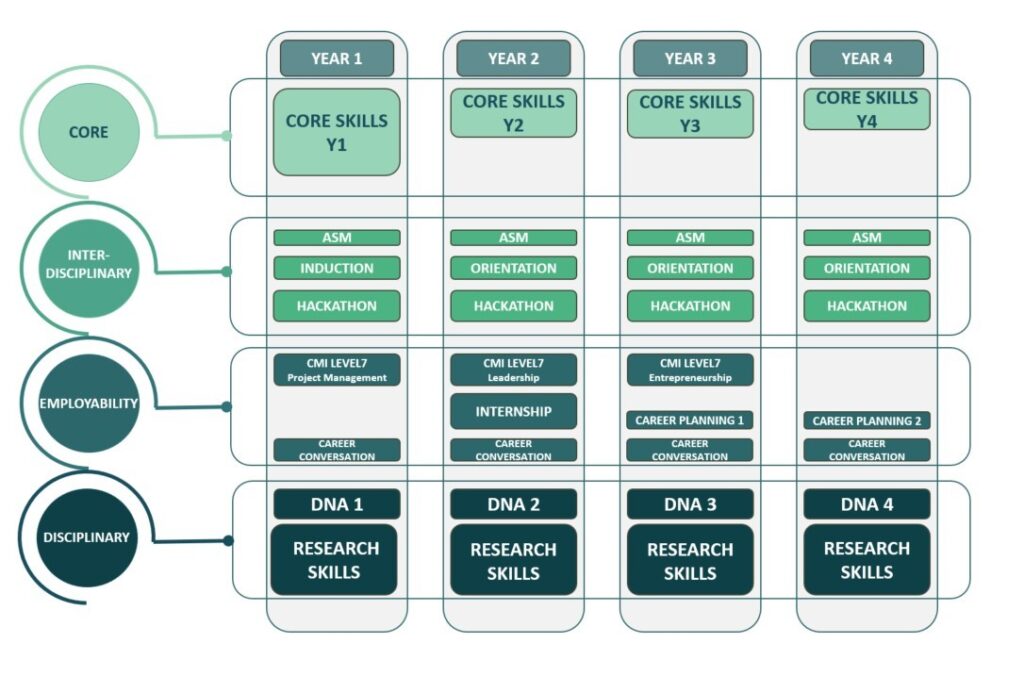QUARTILES-DLA provides an outstanding training and development programme that prepares and positions students as future research leaders and innovators across government, industry, NGOs and academia; equipping students with the skills, vision and experience essential to lead, communicate and translate innovative interdisciplinary research that meets the complex environmental grand challenges posed by climate change, biodiversity loss and sustainability.
Our partnership with over 50 partners across government, industry, NGO and policy development ensures student training is appropriate to fill skills gaps across multiple sectors. We will provide students with the essential skills, experience and opportunity to lead, communicate and translate leading-edge science that addresses the complex challenges posed by climate change, biodiversity loss, and sustainability.

Development Needs Analysis (DNA)
Central to training will be an evolving Development Needs Analysis (DNA) formed from a skills audit and data management plan undertaken at the start of the PhD. This will identify the skills essential to the research project and the individual training needs of the student, and will be revisited across the PhD journey and formally logged during progression and evaluation.
Core Training
Core skills training reflects the training that all postgraduate researchers require to navigate their PhD, design and implement their research projects and analyse data and effectively communicate research. It is scheduled throughout the PhD journey and is accessible flexibly to fit students’ needs.
Year One Core Skills: literature searching and synthesis; effective student-supervisor relationships; critical thinking, responsible research and innovation, emphasising ethical, open, transparent, reproducible and sustainable research practices; data management and security; robust experimental design and hypothesis testing; risk assessment; health and safety in the lab and field; project management; academic independence; dealing with imposter syndrome.
Year Two Core Skills: programming in R; introduction to statistical analysis; communication strategies for diverse audiences; social media training; translating research into impact; writing skills.
Year Three Core Skills: advanced statistical analysis; fostering innovation and entrepreneurship within research; academic publishing and peer review; media training.
Year Four Core Skills: as students progress to thesis construction training will emphasise writing skills and preparing for thesis submission and viva examination procedures.
Interdisciplinary Training
Interdisciplinary skills training is embedded within the curriculum to enhance students’ capacity to understand and address the complexity of environmental issues, facilitate the development of innovative solutions, enhance effective communication skills and consider practical policy implementation. This is structured around an annual, stakeholder-led 2-day immersive hackathon, where students will discuss an emerging environmental sciences issue from different scientific social, economic, and political contexts and perspectives; then work collaboratively to develop innovative solutions to live policy, industry and business facing environmental challenges that our stakeholders and partners present.
Employability Training
Employability training is designed to prepare QUARTILES students to successfully transition into and excel in their future careers, whether in academia, industry, policy or entrepreneurship; by developing the knowledge, skills, and experiences necessary to navigate the job market confidently; identify and pursue their career goals, and secure the resources needed to advance their professional aspirations. Employability training is structured around four components:
- Internship: Students will each have a three month internship with an external partner, tailored to their research project and career ambitions. This will be planned from the outset of the project in discussion with the supervisor and career mentor, with suggested timing around months 20-30 to enable the development and execution of a pathway to impact plan. This immersive experience will be invaluable for developing professional skills that enhance employability, enhance interdisciplinary outlook, and provide opportunities for networking and downstream job opportunities. Whilst the internship is an integral part of training there will be sufficient flexibility in timing and mode of delivery to accommodate individual student circumstances.
- Career Conversations: students will attend quarterly career showcases to hear and interrogate the experiences and career journeys of a range of researchers who have succeeded in different career paths. Conversations will be hosted by our QUARTILES students and will include speakers drawn from across our partners, stakeholders and QUADRAT alumni.
- Career planning: students will be supported by careers advisory teams from their host institutes who are primed to provide guidance around career planning for PGR across a diversity of career pathways and associated advice on CV and application development and interview practice. For those students looking to develop a career in academia, both institutes have coaching and mentoring for independent research fellowship applications across schemes and disciplines.
- Chartered Management Institute Level 7 Certificate in Strategic Management and Leadership: Students will gain a professional CMI (level 7) accredited qualification awarded through the QUB Graduate School. This involves twelve days of training around leadership, management and entrepreneurship, taken flexibly across the PhD. This will provide students with a recognised qualification that enhances employability, invaluable professional transferable skills and evidence of research in practice. Students receive CMI associate membership throughout their funded period and 12 months beyond.
Disciplinary Training
Disciplinary training will be delivered through interactions with supervisors, stakeholders and their associated research groups, guided by the student’s DNA. Students will also be able to access the world-leading facilities available at both UoA and QUB to advance their research, with both institutes investing heavily to support high-performance computing capacity, multi-omics core facilities, microscopy suites, analytical facilities, drone technology, autonomous oceanographic monitoring, marine mesocosms, aquaria (marine and freshwater). Both sites also offer focussed training and support around bioinformatics, environmental informatics and biostatistics, which will be open to all QUARTILES students.
Annual Science Conference (ASC)
The Annual Student Conference, held every October, brings together the student, supervisor, stakeholder and alumni communities to showcase current QUARTILES research, discuss ongoing and emerging research topics, develop research themes for future studentship calls, foster collaboration and facilitate peer networking and team building. At the ASC first year students will present a flash presentation of their research project and aims; second year students will present a poster and third year students a talk.



